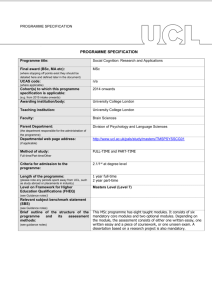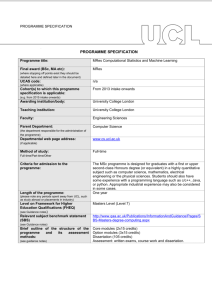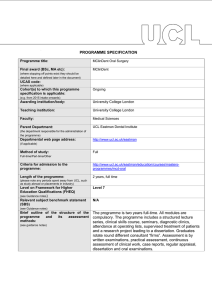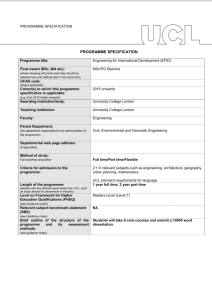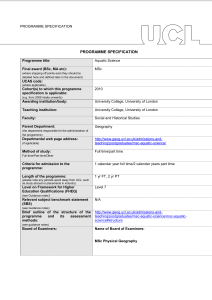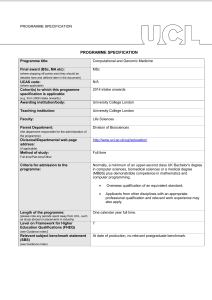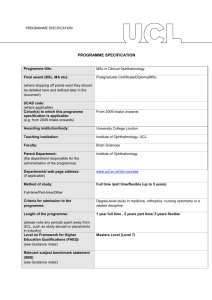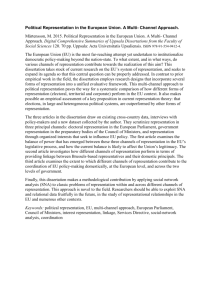MSc Cognitive and Decision Sciences
advertisement
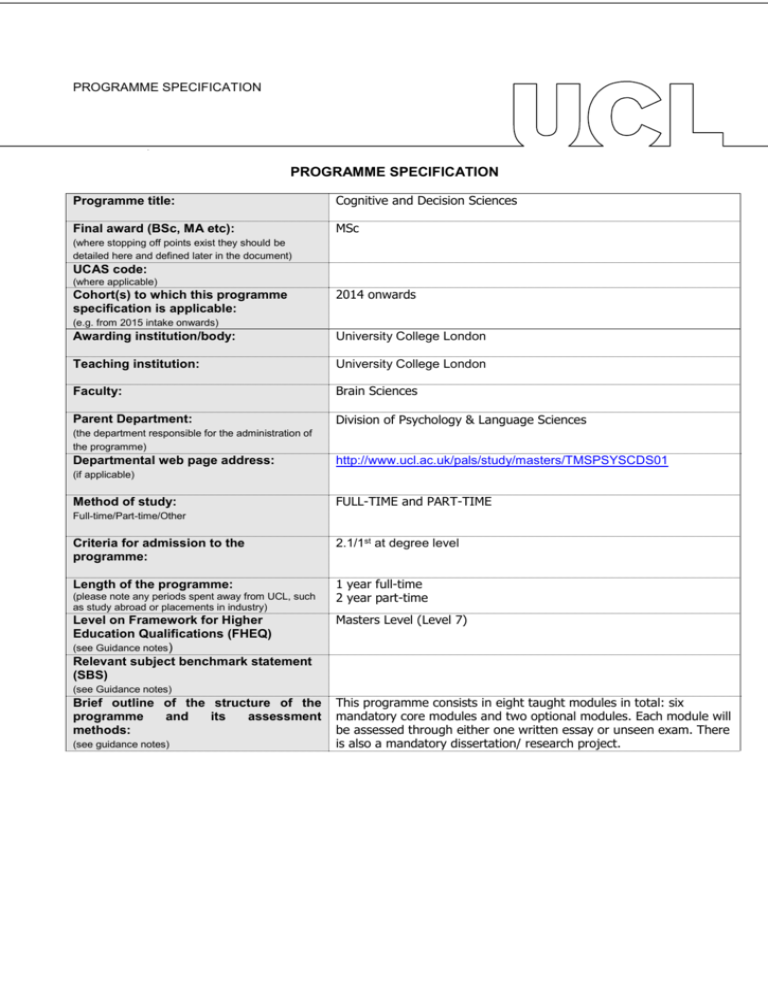
PROGRAMME SPECIFICATION PROGRAMME SPECIFICATION Programme title: Cognitive and Decision Sciences Final award (BSc, MA etc): MSc (where stopping off points exist they should be detailed here and defined later in the document) UCAS code: (where applicable) Cohort(s) to which this programme specification is applicable: 2014 onwards (e.g. from 2015 intake onwards) Awarding institution/body: University College London Teaching institution: University College London Faculty: Brain Sciences Parent Department: Division of Psychology & Language Sciences (the department responsible for the administration of the programme) Departmental web page address: http://www.ucl.ac.uk/pals/study/masters/TMSPSYSCDS01 (if applicable) Method of study: FULL-TIME and PART-TIME Full-time/Part-time/Other Criteria for admission to the programme: 2.1/1st at degree level Length of the programme: 1 year full-time 2 year part-time (please note any periods spent away from UCL, such as study abroad or placements in industry) Level on Framework for Higher Education Qualifications (FHEQ) (see Guidance notes) Relevant subject benchmark statement (SBS) Masters Level (Level 7) (see Guidance notes) Brief outline of the structure of the programme and its assessment methods: (see guidance notes) This programme consists in eight taught modules in total: six mandatory core modules and two optional modules. Each module will be assessed through either one written essay or unseen exam. There is also a mandatory dissertation/ research project. Board of Examiners: Name of Board of Examiners: MSc Cognitive and Decision Sciences Professional body accreditation (if applicable): Date of next scheduled accreditation visit: EDUCATIONAL AIMS OF THE PROGRAMME: The course will prepare students for both academic research in the cognitive and decision sciences, and provide a basis for the application of this research in applied settings in a range of areas including marketing, finance, and public policy. PROGRAMME OUTCOMES: The programme provides opportunities for students to develop and demonstrate knowledge and understanding, qualities, skills and other attributes in the following areas: A: Knowledge and understanding Knowledge and understanding of: Key principles of cognitive science; normative principles of decision making; relation of cognitive science to decision making. Teaching/learning methods and strategies: Seminars, involving lecture presentations; student presentation; discussion of key papers; supervised dissertation Assessment: Exam/Essay/Dissertation B: Skills and other attributes Intellectual (thinking) skills: Understanding relation between normative and descriptive models. Understanding nature and objectives of computational modeling. Understanding the logic of experimental design and analysis. Teaching/learning methods and strategies: Seminars; practical experimental, statistical and computational work; supervised dissertation Assessment: Exam/Essay/Dissertation C: Skills and other attributes Practical skills (able to): Statistical analysis; computer programming (matlab); experimental design and implementation Teaching/learning methods and strategies: Practical experimental, statistical and computational work; supervised dissertation Assessment: Formative: Problem sheets and problem classes; practical computational mini-projects Summative: Dissertation D: Skills and other attributes Transferable skills (able to): Logical and probabilistic thinking; learning how to evaluate hypotheses; learning how to model complex phenomena; computer programming; data analysis; presentation writing; report writing Teaching/learning methods and strategies: Seminars; practical experimental, statistical and computational work; supervised dissertation Assessment: Exam/Essay/Dissertation and practical experimental and computational mini-projects The following reference points were used in designing the programme: the Framework for Higher Education Qualifications (http://www.qaa.ac.uk/academicinfrastructure/benchmark/default.asp; the relevant Subject Benchmark Statements (http://www.qaa.ac.uk/academicinfrastructure/FHEQ/default.asp); the programme specifications for UCL degree programmes in relevant subjects (where applicable); UCL teaching and learning policies; staff research. Please note: This specification provides a concise summary of the main features of the programme and the learning outcomes that a typical student might reasonably be expected to achieve and demonstrate if he/she takes full advantage of the learning opportunities that are provided. More detailed information on the learning outcomes, content and teaching, learning and assessment methods of each course unit/module can be found in the departmental course handbook. The accuracy of the information contained in this document is reviewed annually by UCL and may be checked by the Quality Assurance Agency. Programme Organiser(s) Prof Bradley Love Name(s): Dr Adam Harris Date of Production: August 2009 Date of Review: October 2014 Date approved by Head of Department: 22/9/08 Date approved by Chair of Departmental Teaching Committee: Date approved by Faculty Teaching Committee 20/10/14 November 2014
